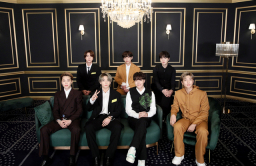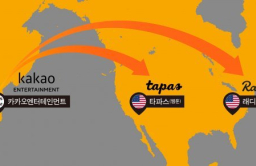-
KOSPI 2577.27 -2.21 -0.09%
-
KOSDAQ 722.52 -7.07 -0.97%
-
KOSPI200 341.49 +0.02 +0.01%
-
USD/KRW 1396 -2.00 0.14%
Hasty overseas expansion hurts Korean entertainment sector
Entertainment
Hasty overseas expansion hurts Korean entertainment sector
HYBE’s Ithaca, CJ ENM’s Fifth Season, Naver’s Wattpad, Kakao’s Radish and Tapas suffer mounting losses
By
May 07, 2024 (Gmt+09:00)
5
Min read
News+

South Korea’s entertainment and content industries suffered from hasty expansions with investments of billions of dollars in the global market through acquisitions of foreign companies, losing money from those entities.
HYBE Co., the label behind global K-pop sensation BTS, and CJ ENM Co., the entertainment powerhouse of the Academy Award-winning film Parasite, were hammered by mounting losses from their overseas units. Online giants Naver Corp. and Kakao Corp. were also hit by rising deficits from webtoon and web novel businesses in other countries.
Such failures resulted from a lack of thorough analysis of the industry and integration of human resources, as well as excessive takeover costs, industry sources said.
Entertainment firms and content providers usually face difficulties in post-merger integration (PMI) due to different cultures between companies. Buyers often give up creating synergy with their own businesses as the existing executives of acquired companies oppose the strategies. Purchasers spend big money on buying other firms for their artists, with these core human assets often leaving them after acquisitions.
“Compared with Korea’s major manufacturers, content companies have yet to build overseas PMI experiences and know-how,” said an investment banking industry source in Seoul. “They may have overlooked the nature of the industry of which the core assets are human, as well as cultural differences.”
South Korean entertainment and content companies spent billions of dollars to acquire overseas firms from 2020 to the first half of 2022, taking advantage of low interest rates, to expand globally.
But few of them reported profits from those deals.
MOUNTING LOSSES
HYBE in 2021 shocked the world’s music industry by acquiring Ithaca Holdings, the label of pop stars Justin Bieber and Ariana Grande, for about $1 billion. Scooter Braun, the founder of Ithaca, had pledged to help HYBE’s artists make inroads into the US market when he sold the label to the South Korean music giant.
HYBE had been optimistic expecting that Ithaca would generate profits of 60 billion won ($44.1 million) a year once offline concerts were resumed following the end of COVID-19 restrictions. The label also bet big as it pinned its hopes on Braun’s networks in the world’s largest US music industry.
Ithaca is now HYBE’s largest risk, however, due to increasing losses. The US label logged a net loss of 142.4 billion won last year, more than double the deficit of 70.1 billion won in 2022.
Its cash cow Bieber suspended tours due to health issues, while major artists including Grande showed signs of leaving the label due to conflict with executives. Braun, the current CEO of HYBE America Inc., acquired a hip-hop label run by his friend for 266.9 billion won although it generated an operating profit of only 500 million won, boosting Ithaca’s losses.
Min Hee-jin, the chief of ADOR, HYBE’s label behind global girl group sensation NewJeans, openly criticized the K-pop behemoth’s takeover of Ithaca.
“It paid an eyepopping 1 trillion won to buy a loss-making company,” said Min, who is in dispute with HYBE.
HOLLYWOOD STUDIOS
Two of the major studios in Hollywood were acquired by South Korean companies in 2021. CJ ENM bought Endeavor Content Parent LLC. of Golden Globe and Oscar award-winning films including La La Land for $775.3 million, while Contentree JoongAng Corp. took over Wiip, producer of HBO’s Mare of Easttown.

The South Korean companies aimed to add global sales networks and competitiveness to K-content such as films and dramas.
But their dreams collapsed as actors and screenwriters went on strike once they closed those acquisition deals. The labor actions increased their fixed costs but reduced their operating rates.
CJ ENM and Contentree failed to normalize the management of those US units as they did not take action due to fears of provoking Hollywood artists willing to stand their ground.
Fifth Season, formerly Endeavor Content, reported a loss of 117.9 billion won last year.
WEBTOON, WEB NOVEL
Naver in 2021 bought Toronto-based Wattpad Corp., the world’s largest web novel platform, for $600 million. That prompted its archrival Kakao to acquire Tapas Media Inc. and Radish Fiction Inc., webtoon and mobile novel platforms in North America, for 780.9 billion won.
The two leading South Korean online giants made such massive investments to lead the global top player in the digital comics and novel market, although sales and operating profits of those content platforms fell far short of the takeover values.
Those acquisitions without thorough due diligence put pressure on the online behemoths with losses of those units.
Radish and Tapas logged a combined loss of 425.2 billion won last year, far more than the 20 billion won shortfall when Kakao acquired them in 2021. Wattpad reported a loss of 9.8 billion won in 2023, swinging from a profit of 3.1 billion won before Naver took over.

But South Korean companies still need to seek global expansion as such losses are inevitable in the early stages, some industry sources said.
“Errors at the initial stage are inevitable, so they should continue to knock on the door of the global market rather than become excessively daunted,” said an investment banking industry executive.
There was one success story amid the failure. Netmarble Corp., a game developer, bought the world’s No. 3 social casino game publisher SpinX Games for $2.2 billion in 2021, betting on the global online gambling market in a move to diversify its business.
SpinX Games reported a profit last year.
Write to Jun-Ho Cha and Ji-Eun Ha at chacha@hankyung.com
Jongwoo Cheon edited his article.
More To Read
-
 Tech, Media & TelecomNaver's Wattpad lays off 30 employees again
Tech, Media & TelecomNaver's Wattpad lays off 30 employees againJan 30, 2024 (Gmt+09:00)
-
Nov 24, 2021 (Gmt+09:00)
-
Nov 19, 2021 (Gmt+09:00)
-
Sep 16, 2021 (Gmt+09:00)
-
 Mergers & AcquisitionsNetmarble bets $2.2 bn on global social casino game market
Mergers & AcquisitionsNetmarble bets $2.2 bn on global social casino game marketAug 03, 2021 (Gmt+09:00)
-
 Mergers & AcquisitionsDeep inside the deal: HYBE-Ithaca merger
Mergers & AcquisitionsDeep inside the deal: HYBE-Ithaca mergerApr 07, 2021 (Gmt+09:00)
-
Apr 02, 2021 (Gmt+09:00)
-
 Mergers & AcquisitionsBehind the scenes of Naver’s $600 mn Wattpad purchase
Mergers & AcquisitionsBehind the scenes of Naver’s $600 mn Wattpad purchaseFeb 01, 2021 (Gmt+09:00)
-
 Mergers & AcquisitionsNaver to acquire web novel platform Wattpad for $593 mn
Mergers & AcquisitionsNaver to acquire web novel platform Wattpad for $593 mnJan 20, 2021 (Gmt+09:00)






